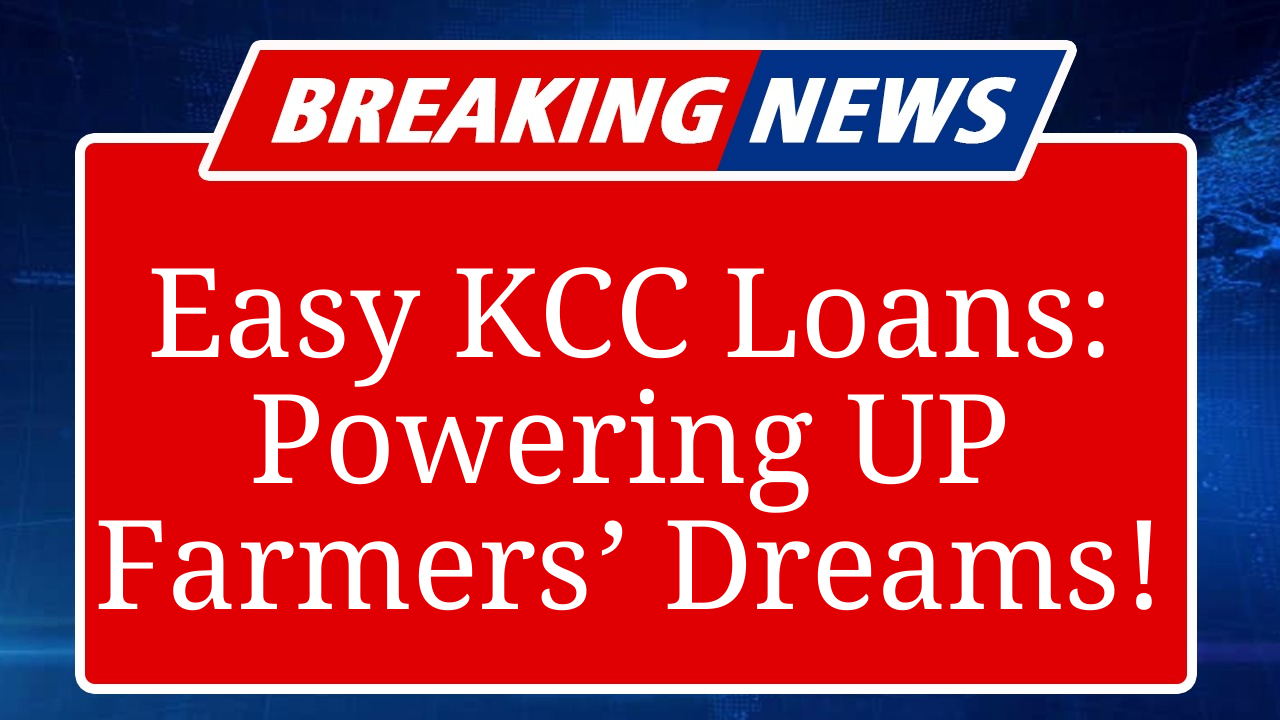“The Kisan Credit Card scheme empowers Uttar Pradesh farmers with timely, low-cost credit for cultivation, farm maintenance, and allied activities. With simplified processes, no collateral for loans up to ₹3 lakh, and digital platforms like the Kisan Rin Portal, farmers gain financial flexibility. Subsidized interest rates and prompt repayment incentives further ease the burden, ensuring agricultural growth and financial inclusion.”
Empowering UP Farmers Through Kisan Credit Card Loans
The Kisan Credit Card (KCC) scheme has emerged as a lifeline for farmers in Uttar Pradesh (UP), providing seamless access to credit for agricultural and allied activities. Launched by the Government of India, the scheme aims to deliver timely and affordable financial support to farmers, addressing their cultivation, post-harvest, and household needs. In UP, where agriculture remains the backbone of the economy, the KCC has gained significant traction, enabling farmers to boost productivity and financial stability.
As of December 2024, over 7.75 crore KCC accounts are active nationwide, with UP contributing a substantial share. The state’s farmers have access to short-term loans of up to ₹3 lakh at a subsidized interest rate of 7% per annum. Those who repay promptly benefit from an additional 3% prompt repayment incentive (PRI), reducing the effective interest rate to just 4%. For animal husbandry and fisheries, loans up to ₹2 lakh are available at similar concessional rates.
The scheme’s flexibility is a key feature. Farmers can use KCC loans for crop cultivation, purchasing inputs like seeds and fertilizers, post-harvest expenses, and marketing produce. It also covers working capital for farm maintenance, such as repairing machinery, and supports allied activities like dairy, poultry, and fisheries. Investment needs, such as buying farm equipment or setting up irrigation systems, are also financed, ensuring a holistic approach to agricultural growth.
In UP, banks like the State Bank of India (SBI), ICICI Bank, and Indian Bank have streamlined KCC processes. Collateral is waived for loans up to ₹2 lakh, and up to ₹3 lakh in cases of tie-up arrangements, reducing financial barriers for small and marginal farmers. The loan limit is determined based on land holdings, cropping patterns, and the scale of finance set by District Level Technical Committees (DLTCs). The validity of a KCC is five years, with a 10% annual increase in credit limit subject to review, offering farmers long-term financial planning.
Digital advancements have further simplified access. The Kisan Rin Portal, launched in August 2023, enhances transparency in loan processing, enabling faster disbursals. Union Bank of India’s Digital KCC, in collaboration with the Reserve Bank Innovation Hub, allows farmers to apply for loans up to ₹1.6 lakh without visiting a branch, using satellite imagery and Aadhaar-based e-signing for verification. This reduces the turnaround time to minutes, a significant improvement from the earlier one-to-two-week process.
The Modified Interest Subvention Scheme (MISS), extended for FY26, ensures the continuation of low-cost credit. In UP, cooperative banks and regional rural banks play a pivotal role, supported by a 1.5% interest subvention to lending institutions. This has driven agricultural credit flow in the state, with institutional credit disbursement through KCC rising from ₹4.26 lakh crore in 2014 to ₹10.05 lakh crore by December 2024.
The scheme also integrates with the PM-KISAN program, which provides ₹6,000 annually to eligible farmers in three installments. Since 2020, this synergy has allowed UP farmers to combine income support with accessible credit, easing financial burdens. Additionally, no processing or inspection fees are charged for loans up to ₹3 lakh, further reducing costs for farmers.
Eligibility for KCC in UP extends to owner-cultivators, tenant farmers, sharecroppers, and self-help groups (SHGs). Farmers above 65 years require a co-borrower below 60, ensuring inclusivity. The application process is hassle-free, requiring basic KYC documents like Aadhaar, voter ID, or driving license, along with landholding proof. Banks like Axis Bank and HDFC Bank offer RuPay Kisan Cards for seamless transactions, including online purchases and cash withdrawals.
Despite its benefits, challenges remain. Awareness about digital platforms and the scheme’s expanded scope, including animal husbandry and fisheries, is still limited in rural UP. Banks are addressing this through camps organized by District Level Bankers Committees, ensuring time-bound issuance of KCCs within two weeks of application.
The KCC scheme’s impact in UP is evident in its role in reducing dependency on informal moneylenders, who often charge exorbitant rates. By offering affordable credit and flexible repayment options tied to harvest cycles, the scheme empowers farmers to invest in modern farming techniques, improve yields, and achieve financial independence.
Disclaimer: This article is based on information sourced from government announcements, bank websites, and recent reports on the Kisan Credit Card scheme. Data is accurate as of September 2025, but policies and rates may change. Readers are advised to verify details with banks or official portals like fasalrin.gov.in for the latest updates.

